- Memories of Nicholas Schaffner and The Beatles Forever - January 4, 2026
- Old Draft: Beatles Folk Memory 1970-1995 - December 8, 2025
- Lights are back on. - December 8, 2025
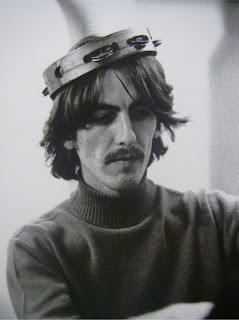 |
| King of Fuh |
The Chicago Tribune’s Greg Kot talks to Olivia Harrison and Giles Martin about the impending release of Early Takes, Volume I, a new set of Harrison rarities from the early solo period. According to them, this is just the tip of the iceberg.
Says Martin, “You get very excited when you see a tape box marked, ‘George, Eric (Clapton), Ringo (Starr) and Klaus (Voorman),’ and then you listen and realize it’s just hours of them chatting in the studio. But other times you stumble across something really great. You are digging for gold, and there was a lot there.”
“Exploring My Own Twisted Mind, Part I”
As I grow older, and become more interested in life and death and the meaning of it all, George is pulling ahead as the “interesting Beatle.” Far as I can tell from the outside, it seems that he continued to evolve as a person, while John, Paul, and Ringo largely remained the same guys they were in 1968. Nothing wrong with that, but George is a fascinating dude. I would love to listen to him talking, because I suspect he got into some pretty deep waters and, being who he was, received counsel from some fairly difficult to meet dispensers of esoterica.

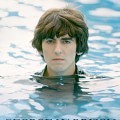
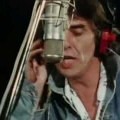
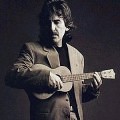

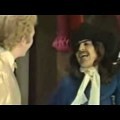
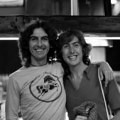
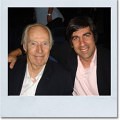
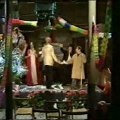
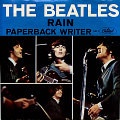
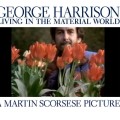
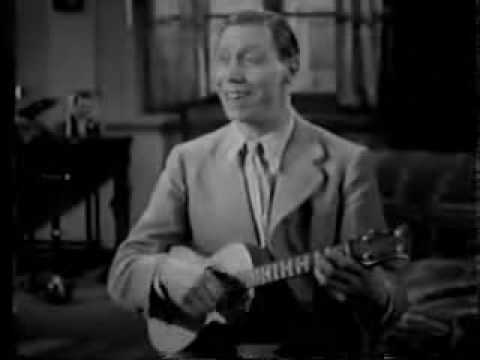
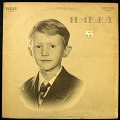
Yes, I agree. George (the “quiet Beatle”) was more interesting, and still growing. I remember Dick Cavett saying some people warned him about having George as a guest, as he was not as interesting as the other Beatles. Shows what idiots were advising Cavett back then. I’m not sure If John in 1980 was the same as 1968. I’m sure all the Beatles were growing and changing. Isn’t that what made them Beatles? (As opposed to, I don’t know, KISS who appeared on “Dancing With The Stars” last week singing (for the billionth time) “I wanna rock and roll all night, and party ever-ree day!”)
Permit me to introduce myself. I’ve been posting comments for some time now as anonymous, because I’m too lazy to register. I posted the link to “How To Play Guitar Like John Lennon.” I posted the hypothesis that John stayed with Yoko out of pride, not wanting to admit to the world (and other Beatles) that he’d been wrong. I’m a major Buddy Holly fan (others may have been called the fifth Beatle, but I think Buddy was the first Beatle).
In addition to my preoccupation with the Beatles and Buddy Holly, I write humor, and I have long admired many classic film comedians and literary humorists. I learned not long ago from Bill Marx (son of Harpo) that when Harpo heard the Beatles in 1964, he predicted that they would be the biggest R&R act in the world.
Now compare Harpo (who really had nothing to do with R&R) to Dick Clark, who was supposedly an expert. Dick Clark didn’t “get” the Beatles at all. Even when Sgt. Pepper came out, Dick was sitting there in the bandstand audience with his microphone and his skepticism, while kids said it was too weird. Remember that Bandstand clip from Anthology? None of the kids liked Sgt. Pepper, then finally one stoner kid pipes up and says it’s great.
Anyway, I’m looking forward to the new George material.
– Hologram Sam
Count me among those who would enjoy a few hours of George, Eric, Ringo and Klaus simply chatting. I’d buy that CD!
This indeed is good news, the fact we may hear more. The early takes stuff is so great.
Hologram, I think you answered your own question about John in 1980. While George had played with other musicians–not sidemen, but equals like Dylan–financed films, raced cars, did a solo tour, threw Bangadesh, wrote an autobiography and remarried between 1968-80, John basically ended up exactly where he was in 1968–a rock star with a young son, flogging those same old JohnandYoko talking points. Which is not to criticize those talking points, only to say that John Lennon was not nearly the seeker that George Harrison was. Maybe he would’ve been, in the 80s and after, but I rather doubt it. Lennon shared Harrison’s taste for gurus but had less of an ability to laugh at himself. There was a stability to Harrison’s self-conception which allowed him to investigate things without the fear of making a Public Mistake, or losing himself in them. Harrison searched for “What is life?”, mostly privately. Lennon searched for “Who am I?”, mostly publicly.
One of the real tragedies of Lennon’s end was how he seemed to be trending towards a more grounded and mature investigation of himself and the world. The impulse was there, just as it was for George. But I think it’s pretty clear–as clear as such a thing could be from outside sources–that Yoko was not the kind of partner that encouraged a lot of change. Which is precisely why Lennon picked her. What made her his Dream Woman in ’68, meant that the 80s would’ve probably been stormy for JohnandYoko.
Well I’ll be the contrarian. I’ve always found George the least interesting Beatle and i still do. Having read some of his interviews over the years where he talks about India and spirituality, my usual reaction to George’s comments is: What the HELL is he talking about?
The man babbled on and on speaking gibberish half the time. I recall reading in some Beatles book where the author described passing George on the stairs at Abbey Road as George held forth on religion as his listener stood with eyes glazed over. And from what I’ve read, George’s one and only tour was a disaster, partly because his voice gave out, partly because he subjected the audience to not one but TWO sets of Ravi Shankar (sp?), and partly because George did too much rambly preaching on stage and not enough singing.
It kind of bugs me that people lately tend to forget all the points where George fell short — the awful movies like that Shanghai Surprise (that Madonna mess of a movie), the mediocre solo albums, the financial mismanagement of his own money.
George’s low points get forgotten and set aside whereas John and Paul get beaten over the heads with their low points. No one lets John or Paul forget where they fell short.
It’s like George has become the Beatle that it’s now acceptable to canonize. We did that to Lennon then realized he was only a man. So now we can on and canonize George. And given that he was as deeply flawed as the others (serially unfaithful to both of his wives, for example), I just don’t think it’s fair to put George up on any pedestal.
As usual, just my 2 cents. Drew
Excellent, Drew! Long live Beatle contrarianism! Here’s two more cents, just in case it’s interesting.
George’s spirituality isn’t my spirituality, but I don’t think we can doubt his sincerity, or its validity; compare Lennon’s compulsive leaping from fad to fad. There’s a difference between “Autobiography of a Yogi” and “Sugar Blues,” and that difference is Harrison’s seriousness, and Lennon’s lack of seriousness. Lennon said all the right things, but was never really interested in transcending the self.
As to Harrison’s tour, I give him credit for the balls–balls that Lennon never had. He might’ve eventually; but don’t assume that a 1981 JohnandYoko tour would’ve been received any better than Harrison was in 1974. I prefer a raga to “Don’t Worry Kyoko,” but YMMV.
As to financial mismanagement: Mr. Denis O’Brien, meet Mr. Allan Klein.
A lot of what sounds like gibberish is simply someone trying to express something fundamentally experiential in language, and (assuming you’re Western, as I am) the terminology can sound like bullshit. If you don’t take it on its own terms, it certainly will.
Not only did George sleep around, he also (reputedly) had a serious coke problem. But unlike John–who did the very same things–George didn’t spend a large chunk of his adult life trying to convince us all that his marriage was the greatest love affair of the 20th Century. There’s a cynicism and narcissism in how John Lennon treated the public that I do not sense to the same degree in George.
To me, George was a recognizable person–can you name one interest or hobby or activity that John Lennon had? I can’t. Can you name one time that John Lennon lent his support to something culturally significant? If you’re going to bring up Shanghai Surprise, bring up Life of Brian, too. While John and Yoko were embroiled in trendy hippie agit-prop, George was raising money for starving people. There’s a huge difference there.
Don’t get me wrong: I think John Lennon was more gifted than George Harrison. I think he was a better musician, and a bigger “genius,” whatever that means. But Lennon’s monomania–unquestionably part of his genius–makes him less interesting to me today.
I don’t think we should put any celebrity–and certainly no Beatle–on a pedestal. Not only does it not help us, it hurts them. They’re all flawed people. But I think George showed a kind of courage that is rare, especially among celebrities, and that kind of courage is interesting to me as I go through middle age. YMMV.
Thanks for the post, Michael. Very much enjoying your novel this far.
While I of course respect everyone’s opinions and preference for “favorite” and most “interesting” Beatle, I’m always somewhat shocked to hear George be their choice. To me, it almost always seems like an “I’m cooler and hipper than you guys because I’m a George guy and not John/Paul.” Really? George? First off, let’s get ATMP outta the way – this was a very good album but not great or special. The best songs were worked on and fleshed out with the Beatles with assistance in lyrics and melody. He never again came close to achieving this success, almost definitely because he didn’t have John/Paul to help his songs out.
George was a morose person and constant prosyletizer throughout his post Beatles life, turning off many he came in contact with. For some reason, in the past few years George seems to have become more popular and appreciated, probably because of his death. I’m not buying it, he just always seemed like such a downer. At least when John seemed like a downer, he was being witty and comical at the same time. George was always saying negative things about his life in the 60s, constantly bitching he didn’t get enough respect from the big two. Grow up George, no one cares that John and Paul didn’t hold your hand and help lead you to the promise land; you simply got their on their collective backs.
He spent so much time worrying about his “next” life that he forgot to enjoy the one he was living.
Sorry if this is a bit pointed, I just don’t see the charm and charisma (and talent) in this man that many see.
You bet, Craig–glad you’re enjoying the book!
The thing about George is that there seems to have been a distinct difference between his public persona and his private personality. In private, George seems to have been anything but morose; and even in public, he’s often extremely wry.
Each Beatle can be seen as one type of reaction to fame and, while I can’t go into it at the moment (Downturn Abbey deadline), it’s clear that George was the Beatle who felt he owed the fans the least, resented their intrusions the most, and in general was painfully aware of the negative sides of the experience. George was a fundamentally private person put in the most public situation imaginable; sometimes he dealt with it gracefully, sometimes not. As fans it can be difficult for us to perceive the negative aspects of being a Beatle, but I think they were quite significant. And if one is attempting to do spiritual work, I imagine they were pretty intolerable. I think George liked to play music, garden, and meditate. After the first flush, I don’t think he liked being a Beatle; and I certainly think is disliked being an ex-Beatle. Pre-1980, I think he considered it a nuisance, and post-1980, an actual threat to his wellbeing. Sadly, he was right.
Craig: “For some reason, in the past few years George seems to have become more popular and appreciated, probably because of his death.”
Definitely agree with this. It’s because people now can admire George’s spirituality without actually having to LISTEN to him bore you senseless, going on and on endlessly about Hari Krishna. It’s George Lite for the hipsters who can say, “George was the one who got the band to go to India. Wasn’t he coooool? He was spiritual. He wasn’t into the fame thing like Paul.”
No of course George hated fame. He hated all the doors that his Beatles connection opened for him into Hollywood and Formula 4 racing. Like anyone would have invited him into either of those worlds if he wasn’t an Beatle. What the heck did he have to whine about, compared to most people?
But, the fans say, George was so “humble.” Right, he sat humbly in his 120-room mansion that also came to him — thanks to the Beatles.
Craig: “George was always saying negative things about his life in the 60s, constantly bitching he didn’t get enough respect from the big two. Grow up George, no one cares that John and Paul didn’t hold your hand and help lead you to the promise land.”
Precisely. The constant “poor me” aspect of George’s personality is a bit grating.
Actually my point here was not to pile on George, though it sure seems that way. My point is that the George hagiographyt has gotten carried away — much like the St. Lennon canonization in the 80s got carried away. Reality check.
— Drew
Hello Hologram Sam,
where can I find your hypothesis that John stayed with Yoko out of pride. I’ve read this blog regularly but this seems to have gone past me. I’ve had the same thought about John and Yoko and would be interested in what you wrote. Thank you.
About George: I have to say, it irks me a bit when meanwhile George is the best Beatle for some. I don’t agree.
Bridgit
John was the loudest, the wittiest, the most willing to expound on the multiplicity that was himself; so it has always been easy, nay, irresistible for his fans and commentators to assess, analyze, and wonder about him. He gives you so much grist.
As well as unnaturally gifted musically, Paul is highly competitive, a skilled maneuverer both socially and legally, and the fierce protector of an emotional and psychological life that is every bit as complex, I’m certain, as John’s was, if not more so (because he analyzed it less). His flippant remarks upon the deaths of his mother and John Lennon suggest either a shallow response to tragedy or (I’m guessing) an emotional shutting down, an impatience and irritation with the expected show of grief. John did his suffering in public, and in stereo; Paul’s has been in private, and only rarely has his music expressed it in the rawest terms. All of that makes him fascinating to me. I don’t think any biographer has gotten near his complexities.
Ringo seems so guileless that one is never tempted to wonder what goes on in his psyche. Yet he is by far the Beatle who had the direst, meagerest upbringing; not to mention nearly dying twice as a child from internal illnesses, the second of which forced him to leave school at the age of (I think) 14. What kind of strength does it take to adjust to those nightmares as easily and well as Ringo appears to have?
As for George, Michael is of course right that he “liked to play music, garden, and meditate.” It’s also well-documented that he liked to do coke, race cars, and spend money, which to me makes him just as interesting as any of the others. (Scorsese’s documentary, despite its shortfalls, did a better job of tracking this theme of “living in the material world” than George’s own music. Add Harrison’s name to those of Jerry Lee Lewis, Little Richard, Marvin Gaye, and other pop stars deeply vexed by their self-entrapment between spiritual certitudes and the addictive pleasures of the secular.)
If we’re talking about “interesting” in the sense of one who is rewarding to think about, deep and extensive in his complexities, then each Beatle is fascinating in his own way.
I ordered “Early Tracks” a week and a half ago; judging from the tracklist, much of the album is ATMP demos that have been out for years (on “Beware of ABKCO” and others). Those are gorgeous performances, very much an Unplugged version of George’s masterpiece, but some of the other titles I don’t recognize and can’t wait to hear.
Well said, Devin: Lennon always gave good interview. He’s definitely the best talker of the bunch. I wonder how much of that is because he often seems to be trying to convince himself of something by convincing someone else of it.
On McCartney’s reactions to his mother’s and to John’s deaths, I’d go with your “emotional shutting down” hypothesis. I think McCartney has dealt with the negatives of fame by splitting his public persona from his private self — he’s alluded to this in interviews. He’s very shielded. A lot of his emotions do come out in his songs, but often at one remove (as through a character) or obliquely.
Harrison seems to have been genuinely miserable about fame’s consequences, to Michael’s point. He was trapped in it — you can’t undo fame very well — but struggled inside it, maybe just as painfully as Lennon. I liked his work with the Traveling Wilburys because he seemed to be having fun with a group of peers, and his last couple of albums had some more lighthearted moments I was happy to hear.
As for Starr, don’t forget the years of alcoholism. He went through some dark times too, and it’s been good to see him coping much better as time has gone on.
And hello, Hologram Sam! I’ve enjoyed your comments and am glad to know who you are.
Nancy, thanks for the reminder of Ringo’s alcoholism. There was also the apparent abuse incident with Barbara Bach some years ago. And it’s not difficult to look at the sad-eyed drummer of ’64 and imagine he had a capacity for depression, active or incipient.
Ringo definitely has clouds over him.
Hi, Bridgit
These are my comments on John’s pride:
He and Yoko took so much real and imagined abuse from the press, from the music industry, from the other Beatles. For Lennon to end the marriage, he would essentially be admitting “Hey, you guys were right. I don’t know what I was thinking.” He might have felt he would have lost respect from the others, after being so militant in his relationship with her. I think the more crap John took about being with Yoko, the more determined he became to call her a genius, the love of his life. To do anything less would be to admit defeat.
Maybe at some point he could have split, if they could both agree that their “official” story would be that she kicked him out for good. Then perhaps he could save face. Then they could both save face. Lennon could get sympathy for being dumped, and Ono could save face for NOT being dumped.
– Hologram Sam